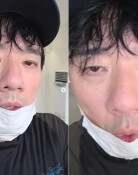Melody of innocence
Melody of innocence
Posted February. 05, 2021 07:49,
Updated February. 05, 2021 07:49

Innately, water and dust are incompatible with each other. It is against law of nature that they coexist as the former is characterized by cleanness while the latter is, literally, dirty. You may think that a bit of dirt may linger in super-clean water but inherently the two do not click each other at all. How could I allow my noble-mindedness, which has been preserved just as a limpid water source for so long, to get stained with such a filthy thing? With that being said, I do not want to claim myself as a human being who has never got dirty at all so please give me a gentle scrub, Mr. Masseur. If you want to do me a favor, please cool down. You do not want to make things harsh on me as if it were a matter of life and death.
Writer and calligrapher Su Shi in China’s North Song Dynasty used a funny comparison technic to prove to his cold-blooded political opponents who used to put harsh pressure on him that Su Shi was 100% innocent. He spent long years being exiled and relegated due to political conflicts. As stated in the introductory part, he jokingly wrote about a lesson that he happened to learn while taking a bath in a public sauna located in a temple. As such, Su Shi was a master of connecting dull and insignificant everyday events with insightful lessons. “A big moment comes along at any time.” Originated from the Chant of Metta in Buddhism, this phrase shows a great example of how skilled Su Shi was at choosing witty stuff just as a public sauna attached to a temple.
“Lyrics to a Dreamy Chant” or “Yeomongryeong” is a famous melody of traditional Chinese poetry during the Song Dynasty. This type of literature has rules only for the number of verses, rhythms or mood. Its name has little to do with a topic or a message. That is why you may have come across many pieces using the melody of “Yeomongryeong.”




![[김순덕의 도발] ‘李부터 연임’ 개헌, 이 대통령은 가능성을 말했다](https://dimg.donga.com/c/138/175/90/1/wps/NEWS/IMAGE/2026/01/16/133172656.1.jpg)

![“설거지해도 그대로”…냄비 ‘무지개 얼룩’ 5분 해결법 [알쓸톡]](https://dimg.donga.com/c/138/175/90/1/wps/NEWS/IMAGE/2026/01/15/133164664.3.png)
